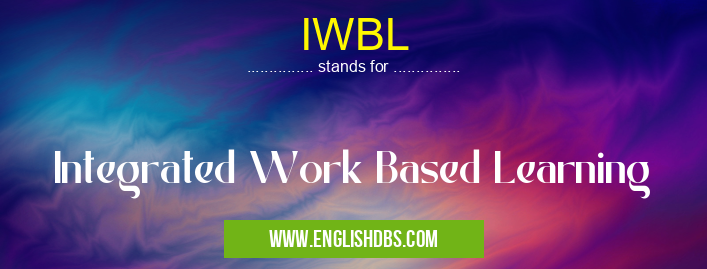What does IWBL mean in EDUCATIONAL
Integrated Work Based Learning (IWBL) is an educational approach that seamlessly combines classroom studies with practical work experience. It enables students to bridge the gap between theoretical knowledge and real-world applications, fostering their professional development and employability skills.

IWBL meaning in Educational in Community
IWBL mostly used in an acronym Educational in Category Community that means Integrated Work Based Learning
Shorthand: IWBL,
Full Form: Integrated Work Based Learning
For more information of "Integrated Work Based Learning", see the section below.
» Community » Educational
What does IWBL Stand for?
IWBL stands for Integrated Work Based Learning.
IWBL in COMMUNITY
IWBL plays a crucial role in fostering community engagement and partnerships. By connecting students with local businesses, organizations, and industries, it promotes:
- Regional Workforce Development: IWBL provides students with opportunities to contribute to local workforce needs, addressing skills gaps and fostering regional economic growth.
- Community Partnerships: It strengthens ties between educational institutions and the community, promoting collaboration and mutual benefits.
- Civic Responsibility: IWBL encourages students to develop a sense of community responsibility and make meaningful contributions to their local surroundings.
Essential Questions and Answers on Integrated Work Based Learning in "COMMUNITY»EDUCATIONAL"
What is Integrated Work-Based Learning (IWBL)?
IWBL is an educational approach that combines academic learning with practical work experience. It integrates real-world projects and tasks into the curriculum, allowing students to apply their knowledge and skills in a professional setting.
What are the benefits of IWBL?
IWBL offers numerous benefits, including enhanced job preparedness, improved critical thinking and problem-solving abilities, increased motivation and engagement, and the development of professional networks.
How does IWBL differ from traditional internships?
Traditional internships are typically short-term, fixed-duration placements where students work under the supervision of a mentor. IWBL, on the other hand, is integrated into the curriculum throughout the academic year, providing students with ongoing opportunities to apply their learning and develop professional skills.
Who can participate in IWBL programs?
IWBL programs are typically offered to students in higher education, including undergraduate and graduate students. Some institutions also offer IWBL opportunities to high school students.
How are IWBL programs evaluated?
IWBL programs are evaluated based on several factors, including student learning outcomes, employer satisfaction, and the overall impact on student success.
What are the different types of IWBL programs?
There are various types of IWBL programs, including apprenticeships, cooperative education, internships, and service-learning. Each type offers a unique blend of academic learning and practical work experience.
How can I find IWBL opportunities?
IWBL opportunities can be found through university career services offices, online job boards, and networking with professionals in your field of interest.
Final Words: IWBL is an innovative educational model that empowers students to apply their knowledge and skills in real-world settings. It fosters their professional growth, enhances their employability prospects, and promotes community engagement. By integrating classroom studies with work-based learning, IWBL prepares students for the challenges and opportunities of the modern workforce.
